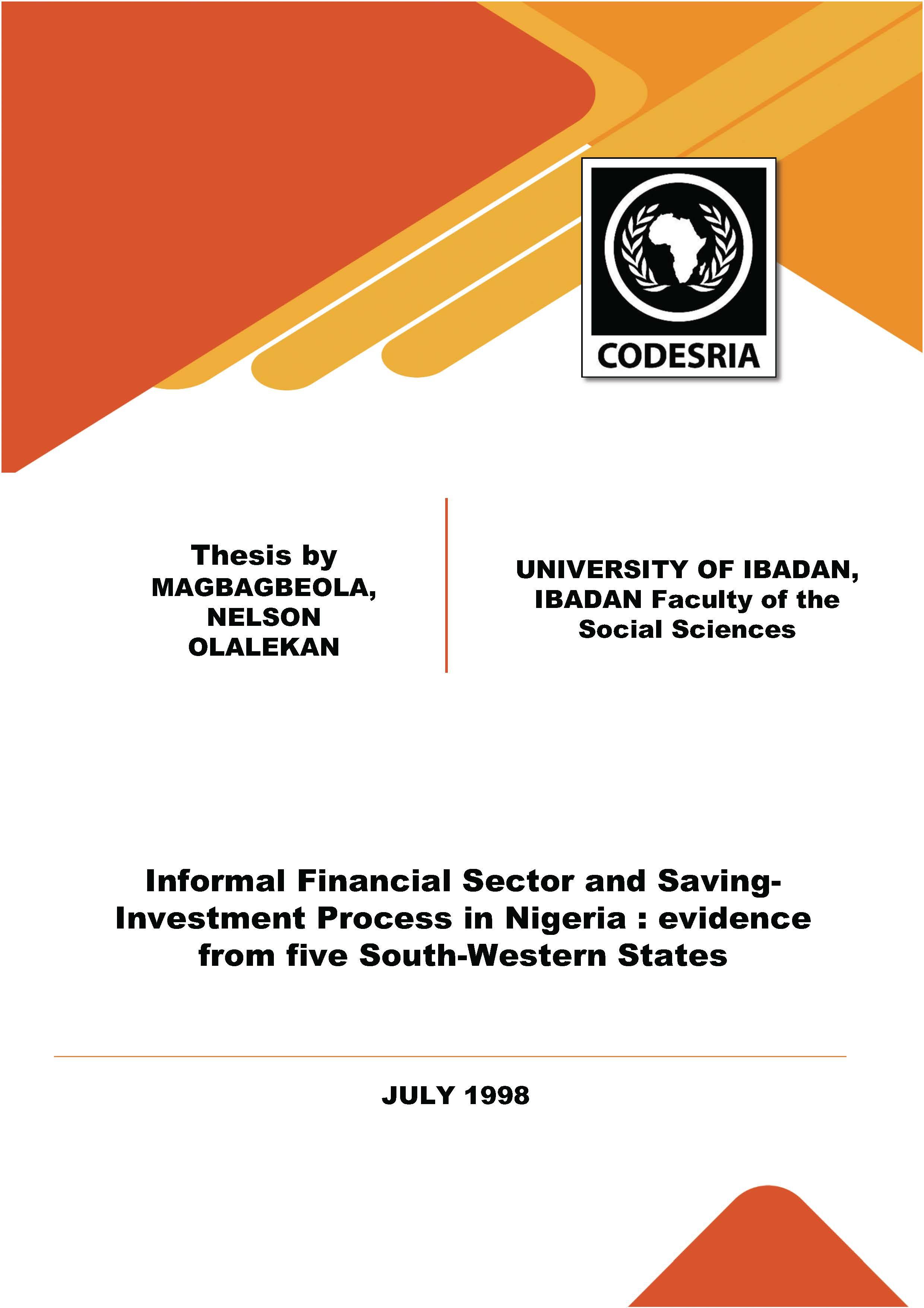Informal Financial Sector and Saving-Investment Process in Nigeria : evidence from five South-Western States
Keywords:
Financial Institutions, savings, informal sector, investment, banking systems, financial market, informal financial sector, financial intermediation, informal finance, NigeriaSynopsis
This thesis presents an empirical study of the informal financial sector in the old Western Nigeria within the theoretical framework of imperfect information paradigm. It estimates the relative size of the informal financial sector in Nigeria by examining some monetary aggregates. The results of the estimation show that, in monetary terms, the informal financial sector is one-third the size of its formal counterpart. One of the areas in which this thesis extends the frontier of knowledge
about informal finance in Nigeria is the use of Qualitative Choice model (logit model) to examine the role of the informal financial sector in the mobilisation and allocation of domestic resources for capital formation in Nigeria. Other tests used include the general summary statistical tests to examine the characteristics of four particular informal finance agents (esusu collectors, ROSCAs, moneylenders and the general public), ascertain the procedure and channels for informal financial intermediation, and analyse the linkages between the informal and formal financial institutions. The results of the study represent a significant input to the literature on informal finance in Nigeria as well as a contribution, of great policy relevance,
towards an integrated development of both the formal and informal financial institutions in Nigeria.
Downloads
References
Adams, D.W. (1992) "Taking a Fresh Look at Informal Finance" In Adams, D.W. and D.A. Fitchett (eds) Informal Finance in Low-:!ncdme Countries. San Francisco, CA: Westview Press.
Adams, D.W. and D.A. Fitchett, eds. (1992) Informal Finance in Low-Income Countries. San Francisco, CA: Westview Press.
Adams, D.W. and V. Sandoval (1989) "Informal Finance in the Phillipines", Economics and Sociology Occasional P.aper, No. 1570. Department of' Agricultural Economics and Rural Sociology. Columbus, Ohio: Ohio State University.
Adams, D.W., Graham,D., and J.D. Von Pischke; eds. (,1984) Undermining Rural Development with Cheap Credit (Boulder: Westview Press).
Adegboye, R.0. (1969) "Procuring Loans by Pledging Cocoa Trees", Journal of the Geographical Association of Nigeria, 12.
Adera, A. (1995) "Instituting Effective Linkages Between the Formal and the Informal Financial Sectors in Africa: A Proposal'' Savings and Development Vol. XIX, No. 1
African Development Bank (ADB) (1995) "Domestic Resource Mobilisation" in African Development Report 1995, Abidjan: Cote d'Ivoire, Chapter 11 .
Ahmed, A.H. (1975) Private money-lenders,in the Sudan Gezira Scheme, Department of Rural Economy, University of Khartoum, Sudan.
Ajakaiye, D.O. and W.0. Akerele (1995) "Overview of Conceptual and Methodological Issues In Informal Sector Research", a paper presented at the CBN/NISER Workshop on Conceptual and Methodological Issues in the Informal Financial Sector Research, 30th - 31st August.
Amani, H.K.R., L.A. Msambichaka, M. Lundahl and S. Hedlund (1987) "Agricultural Credit in Tanzania - a Peasant's Perspective" Savings and Development 11 (4)·, pp. 379-400
Ardener, S. (1964) "The Comparative Study of Rotating Credit Associations", The Journal of the Royal Anthropoligica/ Institute of Great Britain and Ireland 94: 201-229.
Aredo, D. (1993) The Informal and Semi-Formal Financial Sectors in Ethiopia: A Study of the lqqub, Jddir and Savings and Credit Cooperatives. AERC Research Paper 21, Nairobi.
Aryeetey, E. and M. Hyuha (1991) "The Informal Financial Sector and Markets in Africa: An Empirical Study". In: Economic Reform in Sub-Saharan Africa. Ajay Chibber and Stanley Fischer,eds. The World Bank, pp. 125-136.






